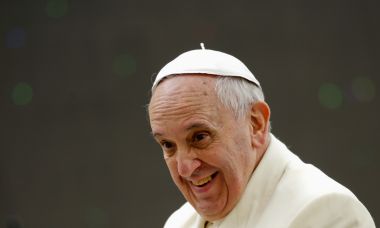Vatican summit highlights moral importance of action on climate change

The world could be on the verge of eviction from another "Garden of Eden" because of catastrophic neglect of the environment, a Vatican summit has been told.
Senior Catholics, economists and scientists met in Rome at the Vatican Science Academy in an attempt to put the moral case for protecting the environment at the top of the political agenda.
The conference was a foretaste of what is likely to be in the forthcoming encyclical on climate change from Pope Francis. It also signals the Church's concerns to be voiced at this year's UN meetings on Sustainable Development Goals.
The environment is expected to at the core of his speech when Pope Francis addresses the UN General Assembly in September, the first Pope ever to do so.
Ban Ki-moon, UN secretary-general, said he believed the Pope's moral voice and leadership would add impetus to the talks. It "will convey to the world that protecting our environment is an urgent moral imperative and a sacred duty for all people of faith and people of conscience."
Cambridge Economics professor Sir Partha Dasgupta called for an end to an obsession with gross domestic product above all else. He said: "GDP is a disgraceful index because it does not count depreciation of our assets - including damage to Mother Nature, the most fundamental asset we have."
Cardinal Peter Turkson, who has helped compose the Pope's encyclical, said the use of fossil fuels was causing disruption on an almost "unfathomable" scale and a "full conversion" of hearts and minds was needed to counter global warming.
"For humans to degrade the integrity of the earth by constant changes in its climate, by stripping its natural forests, to contaminate earth's water, land and air with poisonous substances - all of these are sins. There is an all-embracing imperative to protect our garden, our hope. We must move away from our unthinking infatuation with GDP," he said.
"In our recklessness, we are traversing some of the planet's most fundamental natural boundaries. And the lesson from the Garden of Eden still rings true today: pride, hubris, self-centredness are always perilous, indeed destructive. The very technology that has brought great reward is now poised to bring great ruin."
Astronomer Lord Rees, former President of the Royal Society, acknowledged that some believed a low level of global warming was a risk worth taking but he warned that the chance of irreversible catastrophe was too great.
"It would be shameful if our inheritance was a depleted and hazardous world," he said.
Bishop Marcelo Sanchez Sorondo, who heads the Academy, said it was important for all the world's 1.2 billion Catholics to take the issue seriously. If any Catholic wanted to ignore the encyclical they would need "very good reasons - based not on personal or political opinion, but on science".
The aid agency Cafod reported a YouGov poll that showed seven in ten Catholics will take seriously what the Pope says on climate change.











